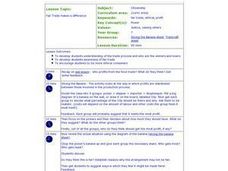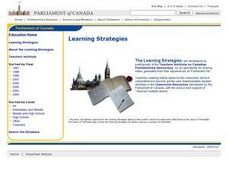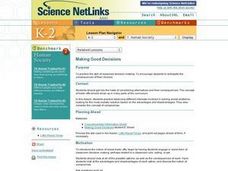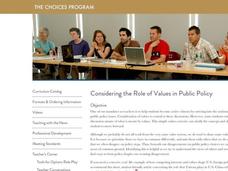Curated OER
"Martial Law in Hawaii After the Attack on Pearl Harbor"
Students explore the concepts of martial law, writ of habeas corpus, due process, discovery and human and constitutional rights during World War II. They assess the roles and responsibilities of government leaders and citizens during...
Curated OER
Fair Trade Makes a Difference
Seventh graders see how profits are distributed among people by slicing a banana. In groups, they role-play who gains the largest profit.
Curated OER
Judges in the Classroom Lesson Plan Juvenile Justice- Adjudicatory Hearing
Students conduct a mock hearing simulating the role of attorneys and witnesses familiarizing them with the juvenile court process.
Curated OER
Active Citizenship: The Civil Rights Work of Bob Moses
Students discuss and describe the impact of Bob Moses as an activist, compare and contrast the work of Bob Moses in the 1960's and today and develop an action plan regarding an issue they feel strongly about.
Curated OER
The Dynamics of the Leadership Process
Young scholars explain the dynamics surrounding the selection of a leader for a country. They explain the involvement of individual citizens in the selection process.
Curated OER
Human Rights : Historical Process towards Individual Application
Young scholars compare governments as they relate to human rights of its citizens.
Curated OER
Citizens' Power : Deliberative Assemblies
Students study the rule that govern the operations of deliberative assemblies. They explore how they can become respectful citizens who explain Parliamentary government.
Curated OER
Launching Your Ship with Citizenship Lesson 4: Hoisting the Flag
Students discuss the U.S. electoral process and brainstorm solutions to increase voter turnout in their community. For this democratic citizenship lesson, students identify keywords in speech and video related to freedom of speech and...
Curated OER
Supreme Court Confirmation Process
Students examine the Supreme Court and the confirmation process. They simulate a confirmation hearing with students role-playing as nominees and others as members of the Judiciary Committee. Students compose short essays outlining the...
Curated OER
Making Good Decisions
Students explore the decision-making process. For this citizenship lesson, students read the book, A Hill Too High to Climb and discuss the decisions the characters had to make in the story. Students discuss how the characters' actions...
Curated OER
The Federal Legislative Process
Students investigate the concept of the Federal Legislative Process. This is done through the use of research on approved class websites. The lesson gives the option of developing other resources for students to use for the teacher to...
Curated OER
Madrid Train Bombings
Students discuss the terrorist train bombings in Madrid, Spain. The class evaluates the value of memorials in the struggle to deal with the grieving process. Groups design a memorial and/or poem to commemorate those lost in the...
Curated OER
The Electoral Process
High schoolers study the history and mechanics of the Electoral College and formulate opinions as to whether this institution should be preserved, modified or eliminated. They compare and contrast electoral and popular votes in the...
Curated OER
Journaling
Students identify, record, and process lessons completed through various service-learning activities. They create two-sided copies of the journal cover on colored paper and decorate so that it shows through both sides. Students then...
Curated OER
Noncombatancy and the Seventh day Adventist Church
Upper graders investigate how the Seventh Day Adventists are objectors to the practice of war. The lesson covers the Civil War and examines the church's position about the practice of war. The research extends to modern wars and learners...
Read Works
The What and Who of Elections
As citizens living in the United States, it is our civil duty to vote. But how does the voting process work? After reading a five-paragraph passage on the basics of elections and voting, young constituents respond to 10 questions...
Brown University
Considering the Role of Values in Public Policy
Strong opinions come from deeply held values. Young citizens explore the values that are most important to them in a class discussion and activity. As they prioritize a list of values cards that include freedom,...
Judicial Branch of California
Where We Fit In: The Judicial Branch
An interesting resource addresses the role of youth in civic participation and community events. It also explains the role of the justice system in creating boundaries and how citizens play a part in the judicial process. Pupils...
Curated OER
Technology and the Media
Students are introduced to the roles and influence of technology and the media on American representative democracy. They examine the effects of the Internet on citizens' role in government and the role and effects of media on the...
Curated OER
Collaborative Editing
With the use of an online editing site, budding authors revise their writing. This is a creative way to have your class practice essay revision. Instead of being a tedious process, editing and revising can be fun.
Curated OER
Homemade Political Parties
Use this 5-day lesson to clarify the platforms of the two major parties, comparing and contrasting against students' beliefs. Begin by looking at unlabeled summaries of both party platforms, having learners identify most with one. Groups...
Curated OER
Civil Rights and Casualties of Wartime
Do your historians fully grasp the consequences of being at war? Help them connect past with present through this group research activity, which has learners analysing repercussions suffered by citizens of countries in conflict. Students...
Curated OER
Free-Writing Exercise
Use the suggested question "What does it mean to be a citizen?" to prompt your writers. After they free-write for five minutes, have them trade papers with another classmate. For the next five minutes, class members respond to the new...
Curated OER
Eminent Domain: Whose Land is it Anyway?
Students research eminent domain and whether or not there has been a land dispute in their community. Students search local newspapers, local history books or talk with civic leaders and long-time citizens and create a chart showing the...























